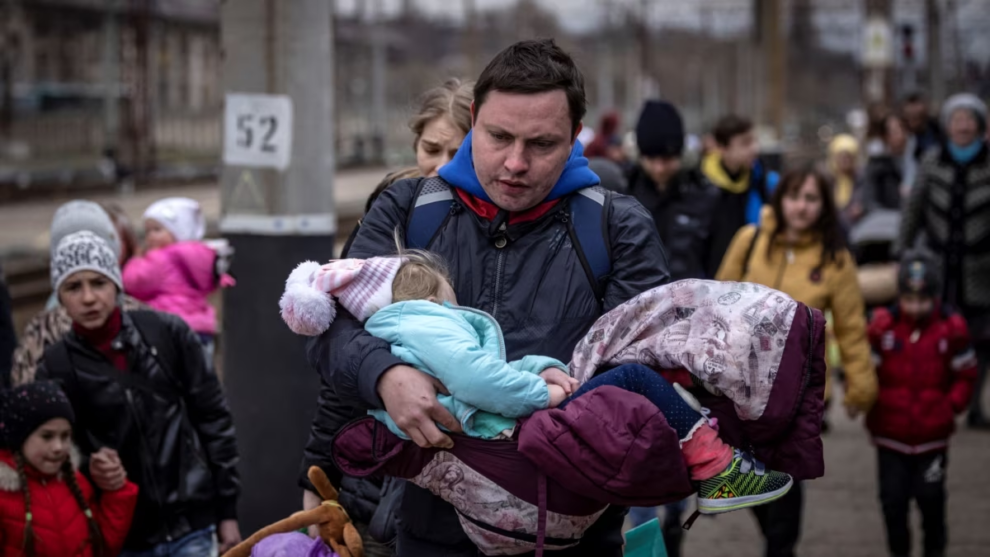Russia’s transfer of Ukrainian children to areas under its control in Ukraine, as well as on Russian territory, constitutes a “war crime”, the UN Special Commission on Ukraine said today, also highlighting possible crimes against humanity.
However, the head of this Commission stated that no evidence of genocide would have been found. “We found no evidence that genocide was committed inside Ukraine,” Eric Mose, head of that commission, told reporters. He added that the Commission is examining evidence and that there are “some aspects that may raise questions” about possible genocide.
In its first report since the start of the Russian invasion of Ukraine on February 24, 2022, the UN Commission of Inquiry concludes that “the situations it examined regarding the transportation and displacement of children, within Ukraine and the Russian Federation respectively, violate the international humanitarian law and constitute a war crime”.
According to Kyiv, 16,221 children were deported to Russia by the end of February, but the Commission was unable to verify these figures.
According to her, however, Russian officials have taken legal and political measures regarding the transfer of children from Ukraine and that Russian President Vladimir Putin signed a decree in May 2022 making it easier to grant Russian citizenship to some children.
Investigators also accuse Moscow of possible “crimes against humanity.”
“The Commission found that the waves of attacks carried out by the Russian armed forces, starting on October 10, 2022, against Ukrainian energy infrastructure and the use of torture by the Russian authorities could constitute crimes against humanity,” they emphasize, proposing the conducting further investigations.
In particular, the Commission established “a pattern of widespread illegal detention” in areas controlled by the Russian armed forces, targeting many people, including women and children.
Certain categories of people held in these “specialized facilities” in Ukraine and Russia are, according to researchers, systematically tortured.
One former prisoner, the Commission continues, was beaten as “punishment for speaking Ukrainian” and for “not remembering the lyrics of the Russian Federation anthem”.
This type of torture “may constitute a crime against humanity and should be investigated further,” the researchers said in their statement.
It is recalled that on Monday, a source told Reuters that an ICC prosecutor is expected to seek a judge’s approval to issue arrest warrants against several Russians in connection with the abduction of children from Ukraine and their transfer to Russia, as well as the targeting of political infrastructure.
Mariupoli
The Commission also sought to verify whether the shelling and siege of Mariupol, in southeastern Ukraine, could constitute a crime against humanity. However, he concluded that he does not have the evidence to reach such a conclusion, as he did not have access to Donetsk province, home to Mariupol, a port city that was besieged for months by the Russian military before falling in May 2022.
However, the Commission recommends that the investigation continue.
This team of investigators was set up last year by the UN Human Rights Council, whose 47 member states must decide in early April whether or not to renew their mandate.
The Commission has so far visited 56 sites and interviewed 348 women and 247 men. His investigators mainly inspected damaged sites and burial and torture sites.
This is the first time investigators have published a written report, but they had pointed out last September to the media that it was then too early to talk about crimes against humanity, contrary to what non-governmental organizations and Ukraine claim.
On the other hand, they had accused Russian forces of committing a “significant number” of war crimes in four Ukrainian provinces during the first weeks of the invasion.
All the evidence they have gathered since then shows, they say, that Russian forces “committed a wide range” of violations of human rights and international humanitarian law, also known as the Law of War.
“Many of these constitute war crimes and include deliberate killings, attacks on civilians, illegal detention, torture, rape, forcible transportation and deportation of children.”
The Commission also points out that it has identified “a small number of violations committed by the Ukrainian armed forces”, notably two incidents that were classified as war crimes, in which Russian prisoners of war were shot, wounded and tortured.
Source: capital















